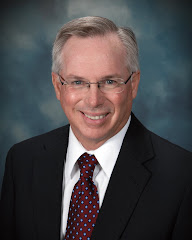November 16, 2009 Volume 1, Number 11
_________________________________________________________
Appointment to House Appropriations Committee
In August I received word that I had been appointed to the Appropriations Committee. This mid-term move is rather unusual, and maybe it is the result of a freshman legislator asking a few too many questions! In the press release announcing the appointment, Speaker of the House Mike O’Neal stated “I appreciate Don's desire to work for consensus under difficult fiscal circumstances. We are all going to have to come together to pass a sound budget in 2010.” The House Appropriations Committee and the Senate Ways and Means Committee are the two legislative committees that perform the difficult task of preparing a state budget. This summer, due to the fiscal difficulties the state is facing, Appropriations Committee Chairman Kevin Yoder took the unusual step of scheduling a series of interim meetings for the committee, starting in August. We also met in October and are scheduled to meet again on November 23 and 24. This series of meetings allows us to take testimony from agency heads regarding steps they have taken to date to manage the budget cuts, and the steps they will be forced to take if a new round of cuts is imposed on them. We have also had conversations with a panel of five school superintendents, examined ending cash balances of the various state funds, and received updates on the status of the Unemployment Insurance Trust Fund and KPERS. Additional testimony has dealt with suggestions on cost saving opportunities for the state and how best to navigate our way out of the recession. These meetings have been invaluable, and I applaud Chairman Yoder for being proactive and enabling us to get a head start on the budget-building process. I believe this will result in more informed and appropriate decisions, and a better final product. The need for these early meetings was underscored last week when the Kansas Consensus Revenue Estimating Group reported their current estimates for Fiscal Years 2010 and 2011. They are forecasting a $459 million shortfall in the State General Fund for 2010, and an additional $263 million projected deficit for 2011.
____________________________________________________
Why Property Tax?
In the process of getting familiar with state finances, I came across some intriguing information. In Fiscal Year 2008, tax revenues generated to fund all levels of government in the state of Kansas were:
Property tax - $3.766 billion
Income and privilege tax - $3.41 billion
Sales tax - $3.126 billion
It is interesting and surprising to me that property tax is the largest of the three. Why do we rely so heavily on property tax? I can think of a number of reasons:
1. It is a more stable tax base than sales or income.
2. In the case of real property, we know exactly where it is, how much of it there is, who owns it, and approximately how much it is worth.
3. Some functions of local government (police and fire protection, streets, road and bridge) provide tangible value to real property, and so some level of taxation of property is appropriate.
4. It is easy. Changing income tax or sales tax rates is always a very contentious process, with great political risk. How much easier it is to let the locals raise taxes a little at a time in counties, cities, and school districts across the state. And the state legislature has even found ways to accelerate this process by doing such things as reneging on promised Local Ad Valorem Tax Reduction Fund payments, capturing a portion of liquor revenues promised to local governments, and taking actions that force school districts to raise their LOB.
But I think it is time to ask ourselves if this is the best tax policy for the state of Kansas. Is ownership of property the best measure of who can and who should pay? In the early days of England it probably made sense, because property was primarily owned by an elite landed gentry. But I seriously question whether that is true of 21st century America, where a beginning young farmer who purchases a quarter of land with 30% down gets the privilege of paying property taxes on both his equity and his debt. The same goes for the young newly married couple who purchase their first home. The fact is that ownership of property is no longer an accurate measure of wealth or ability to pay. And it produces very uneven burdens for different sectors of the economy. Why should property intensive industries like agriculture and natural resources shoulder a much greater portion of the burden of educating Kansas’ youth than service industries like legal, medical, or accounting, where property ownership is typically limited to a storefront?
The legislature is indirectly recognizing the inequity inherent in property tax when it grants property tax exemptions to selected industries or even individual businesses. Problem is, each time we grant an exemption we force the remaining nonexempt property owners to bear the burden of increased responsibility for financing local government. And each time we grant an exemption, we are unbalancing the playing field. Do we really believe that government can accurately and fairly pick winners and losers? Are equal opportunity and personal responsibility not important anymore?
There are communities in this state, including several in the 118th District, where the total property tax mill levy is now over 200 mills. That is a tremendous disincentive to any kind of expansion of economic activity, and it is very difficult to overcome. And the entities that might be seriously interested in starting or expanding their business in such communities are rarely large enough or sexy enough to warrant much consideration for any kind of tax breaks.
The current fiscal crisis gives us opportunity to critically examine every governmental function and every expense, and the Appropriations Committee is already working on it. I believe the crisis is also an appropriate time for us to step back and take a look at what we are doing revenue-wise. What is the best long-term tax policy, that would be most citizen- and business-friendly, that spreads the burden of financing governmental operations fairly, evenly, and broadly across all citizens and all industries of the state? I know this is a very philosophical question, but I believe that small incremental changes to tax policy can have the cumulative effect of seriously distorting the overall tax picture, and I fear that is exactly where we find ourselves today. It is now time to begin the process of looking for a better, fairer, more progressive way of financing state and local government in Kansas.
_____________________________________________________
We Want a Divorce!
Recently there have been various proposals circulating that would in some way reassert state sovereignty. A related resolution would attempt to exempt the state of Kansas from the requirements of national health care insurance reform, if and when it is passed. The stimulus for these proposals is certainly understandable, as all of us can recite multiple instances where federal intervention and control of our personal and professional lives is unwanted, unnecessary and greatly resented. And it certainly appears to us that the current administration and majority party in Congress are hell-bent on aggressively expanding the federal government’s reach even farther. But can we realistically tell the federal government at this point to butt out and leave us alone… in effect announce to the feds that we want a divorce? It is important to remember that most of the federal “coercions” have used the “carrot” approach… they have encouraged states to take certain actions with the promise of substantial cash incentives. Federal highway funds come with strings attached regarding speed limits and other traffic regulations. State expenditures for Medicaid are more than matched by federal dollars (40-60 match). These are just two examples, but federal dollars find their way into essentially every aspect of state government, and have a major impact on social services, public safety, transportation, and education programs. In most, if not all instances, if we tell the feds that we reject their regulations and requirements, the dollars disappear. We would be left to fund state operations completely on our own. How serious would this be? Federal funds in the fiscal year 2010 budget total $3.748 billion – roughly 29% of the total all funds budget. Or, to put it another way, that $3.748 billion is about $300 million greater than all income tax revenues paid in to the state. So if we were to really get serious about severing ties with the feds it is likely that we would need to double income tax rates, or increase property or sales tax rates by an equivalent amount. Would any of us be willing to pay that price? And even if we were, could Kansas stay competitive with neighboring states that refuse to cut the umbilical cord to the federal government?
____________________________________________________
Interesting Websites
In Defense of Agriculture Those of us who are involved in production agriculture have grown quite weary of the shallow, uninformed criticisms that are frequently heaped upon our industry by those who think they know better than us how we should conduct our business. A recent article in Time magazine is a good case in point. This link is to a very eloquent rebuttal to those misguided arguments, written by a Missouri farmer.
Invent, Invent, Invent An op-ed piece by New York Times columnist Thomas L. Friedman about the recession and the steps America should take during these tough times. It is his opinion that “We might be able to stimulate our way back to stability, but we can only invent our way back to prosperity.”
The Jason Project In August the oceanographer Robert Ballard, the man who found and explored the wreckage of the Titanic, gave a very interesting talk at the Council of State Governments’ Midwest Legislative Conference in Overland Park. The Jason Project is his brainchild, and it exists to connect students with great explorers and great events to inspire and motivate them to learn science. Ballard, who has gained international fame for his top-notch work as an oceanographer, is a native of Wichita.
How the States Compare In the “misery loves company” category, this interactive graphic from CNN-Money illustrates unemployment and foreclosure numbers for all fifty states.
Worldwide Commercial Flight Patterns No useful information here, but fun to watch anyway. It is a computer simulation of every commercial flight in the world during a 24-hour period. You can also scroll down to see air patterns for U.S. air travel, flights into and out of Atlanta, and FedEx flights.
____________________________________________________
Cowboy Logic: "If people concentrated on the really important things in life, there'd be a shortage of fishing poles."
_____________________________________________________
Quote of the Week: “An opinion should be the result of thought, not a substitute for it.” - Jef Mallett
Subscribe to:
Comments (Atom)




